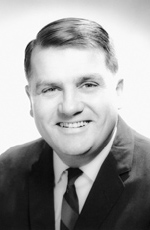Donald Pinkel
Donald Pinkel (September 7, 1926 – March 9, 2022) was an American medical doctor and pediatrician renowned for his pioneering work in the treatment of childhood leukemia. Before Pinkel's research in the 1960s, leukemia was considered an invariably fatal disease. His development of the "total therapy" approach, which combined multiple chemotherapy drugs, significantly improved survival rates and is considered the first effective treatment for childhood leukemia.
Early Life and Education[edit | edit source]
Donald Pinkel was born in Buffalo, New York. He pursued his undergraduate education at Canisius College, where he earned a Bachelor of Science degree. Following this, Pinkel attended the University of Buffalo (now known as the University at Buffalo) for his medical degree. After completing his medical degree, he served in the United States Army Medical Corps, which provided him with valuable experience in pediatrics and research.
Career[edit | edit source]
After his military service, Pinkel focused on pediatrics and hematology. He joined the newly established St. Jude Children's Research Hospital in Memphis, Tennessee, in 1961, as its first medical director. At St. Jude, Pinkel and his team embarked on an ambitious project to cure childhood leukemia, a disease that had a near 100% mortality rate at the time.
Pinkel's approach, known as "total therapy," involved the aggressive use of multiple chemotherapy drugs, along with radiation therapy and preventive treatment to the central nervous system. This was a radical departure from the single-drug treatments of the time, which had limited success. Pinkel's strategy also included meticulous supportive care to manage the side effects of treatment.
The results of Pinkel's work were groundbreaking. By the late 1960s, the survival rates for children with acute lymphoblastic leukemia (ALL) had significantly increased, with a substantial number of patients achieving long-term remission. Pinkel's "total therapy" became the foundation for modern leukemia treatment protocols and has saved countless lives.
Awards and Recognition[edit | edit source]
Throughout his career, Donald Pinkel received numerous awards and honors in recognition of his contributions to pediatric oncology. These include the Lasker Award, often referred to as "America's Nobel," for clinical medical research. His work has not only changed the landscape of leukemia treatment but has also inspired generations of researchers and clinicians in the field of oncology.
Legacy[edit | edit source]
Donald Pinkel's legacy is seen in the lives of the many children who have survived leukemia because of his innovations in treatment. His work transformed St. Jude Children's Research Hospital into a leading institution for pediatric cancer research. Pinkel's approach to treatment, emphasizing a combination of therapies and meticulous supportive care, has influenced the management of other cancers and diseases.
Death[edit | edit source]
Donald Pinkel passed away on March 9, 2022. His passing was mourned by the medical community and the countless families whose lives he touched. Despite his death, his pioneering work continues to influence the field of pediatric oncology and the ongoing fight against childhood leukemia.
Search WikiMD
Ad.Tired of being Overweight? Try W8MD's NYC physician weight loss.
Semaglutide (Ozempic / Wegovy and Tirzepatide (Mounjaro / Zepbound) available. Call 718 946 5500.
Advertise on WikiMD
|
WikiMD's Wellness Encyclopedia |
| Let Food Be Thy Medicine Medicine Thy Food - Hippocrates |
Translate this page: - East Asian
中文,
日本,
한국어,
South Asian
हिन्दी,
தமிழ்,
తెలుగు,
Urdu,
ಕನ್ನಡ,
Southeast Asian
Indonesian,
Vietnamese,
Thai,
မြန်မာဘာသာ,
বাংলা
European
español,
Deutsch,
français,
Greek,
português do Brasil,
polski,
română,
русский,
Nederlands,
norsk,
svenska,
suomi,
Italian
Middle Eastern & African
عربى,
Turkish,
Persian,
Hebrew,
Afrikaans,
isiZulu,
Kiswahili,
Other
Bulgarian,
Hungarian,
Czech,
Swedish,
മലയാളം,
मराठी,
ਪੰਜਾਬੀ,
ગુજરાતી,
Portuguese,
Ukrainian
Medical Disclaimer: WikiMD is not a substitute for professional medical advice. The information on WikiMD is provided as an information resource only, may be incorrect, outdated or misleading, and is not to be used or relied on for any diagnostic or treatment purposes. Please consult your health care provider before making any healthcare decisions or for guidance about a specific medical condition. WikiMD expressly disclaims responsibility, and shall have no liability, for any damages, loss, injury, or liability whatsoever suffered as a result of your reliance on the information contained in this site. By visiting this site you agree to the foregoing terms and conditions, which may from time to time be changed or supplemented by WikiMD. If you do not agree to the foregoing terms and conditions, you should not enter or use this site. See full disclaimer.
Credits:Most images are courtesy of Wikimedia commons, and templates, categories Wikipedia, licensed under CC BY SA or similar.
Contributors: Prab R. Tumpati, MD

